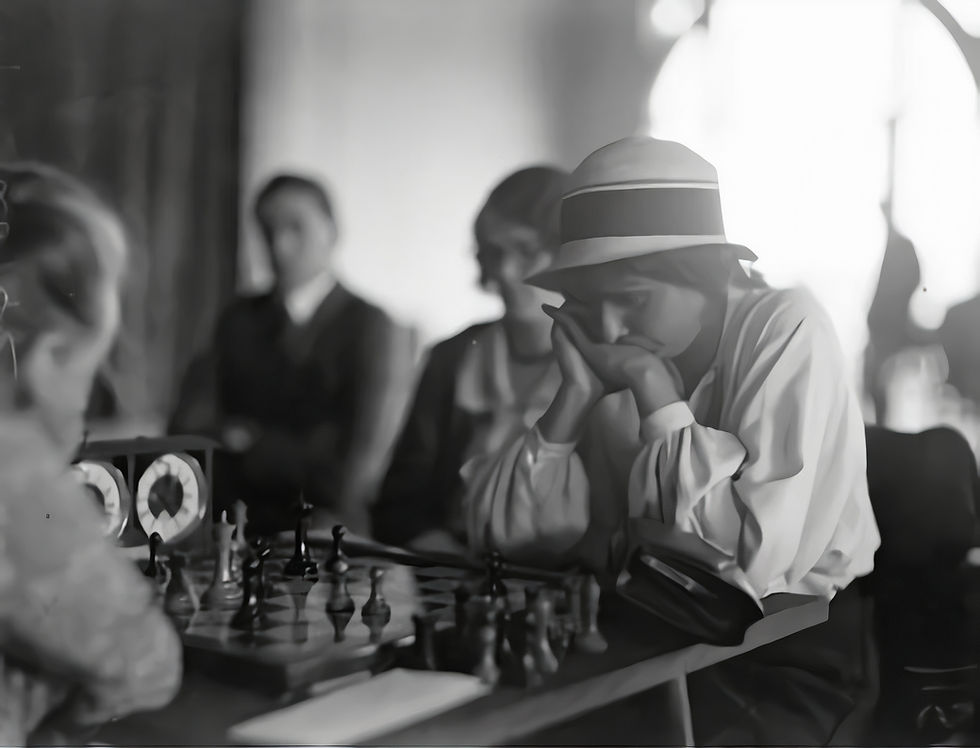Player Profile: Fatima Ghulam
- Veeran Rajendiran
- Jul 1, 2025
- 3 min read
Updated: Sep 11, 2025

The United Kingdom in the early 20th century witnessed some landmark feminist movements. In 1927, just a year before the British government granted women the right to vote, London saw another, relatively subdued form of feminist revolution: The Women’s World Chess Championship. By hosting this tournament FIDE formally recognized women’s participation in competitive chess.
As women’s chess kept growing at a leisurely pace in the West, India was far more occupied with their internal political struggle. The tussle for absolute freedom against the British Raj had consumed India to such an extent that an Indian woman representing the country in chess wasn’t in the struggling country’s periphery.
However, one woman did rise to represent her country. A 21-year-old Fatima Ghulam, or also known as Miss Fatima, had set Britain ablaze with her near-perfect (10.5/11) tournament win in the 1933 British Women’s Chess Championship. She won a prize money of 10 Euros for her performance. This result came only in her second year as a competitor playing her first formal competition was the 1932 British Women's Chess Championship in London where she finished at 6th place.
The data regarding Fatima Ghulam’s brief chess stint are scarce and full of contradictions, but some suggest that she was briefly trained by one of the strongest female players of the 20th century, Vera Menchik. Media took keen interest in her and chess took her even to Royal Court. A fact she confirmed during an interview during the the Sultan of Chess broadcast by Channel 4 on 19 September 1990, she mentioned that she met Queen Mary, the wife of George V and even gave her some Chess instructions! That's some sweet memory...
Fatima Ghulam was employed by the politically influential Umar Hayat Khan, who is famously known for endorsing and sustaining another India’s earliest top-rated chess players, Sultan Khan. And, just like Sultan Khan, the promising start to Fatima’s career had abruptly ended as she was believed to go back to India after her brief stay in Europe.
Here's a coverage by Western Mail during her stay in England:
Western Mail - Saturday 12 August 1933] "NEW WOMAN CHESS CHAMPION - Indian Who Likes Game “Even Better Than Dancing” - Miss Fatima, a young Indian woman, looking little more than a girl and dressed in Eastern style, won the British women’s chess championship at Hastings. Her eleven opponents were mostly of many years’ experience, and included four former champions. Yet out of ten [sic - should be 11] games played she won nine [sic - should be 10] and drew one by remarkable play. No such score has ever been made in a series of similar contests extending over nearly thirty years. Miss Fatima has been for five years in England in the household of Sir Umar Hayat Khan in or near London, living a rather secluded life. She speaks only a little simple English, but with a pretty accent like a delightful child. - STARTED TWO YEARS AGO - She has been described as being still in her 'teens, but in an interview with a Western Mail reporter after her victory she admitted she was aged 21 years and one month. She learnt all her chess In England, having started playing, she said, only two years ago. She plays chess because she likes it, she said, "even better than dancing." Miss Fatima took part in the British women's championship contest last year in London, when she came out sixth, and her improvement in the interval has been astounding. Unfortunately, this is likely to be her last tournament in England, as, according to present arrangements, she is returning to India shortly."
Memorable Game/s:
Fatima Ghulam (White) v Wheelwright, Amy Eleanor (Black), British Chess Championship, Hasting 1933:



Comments